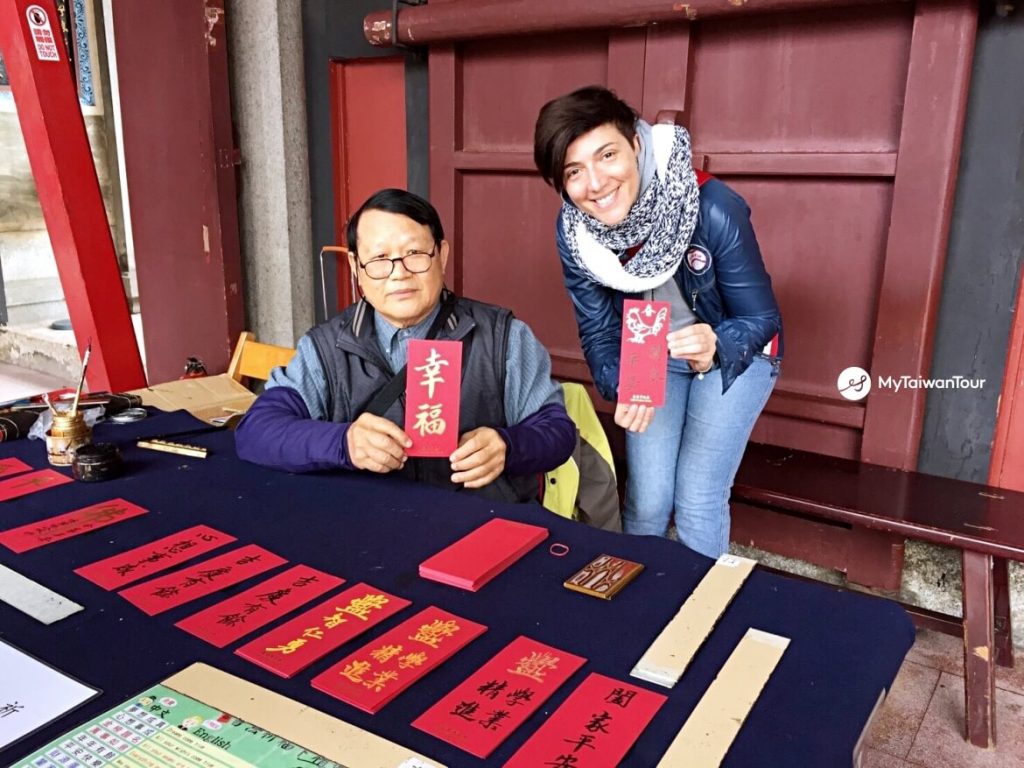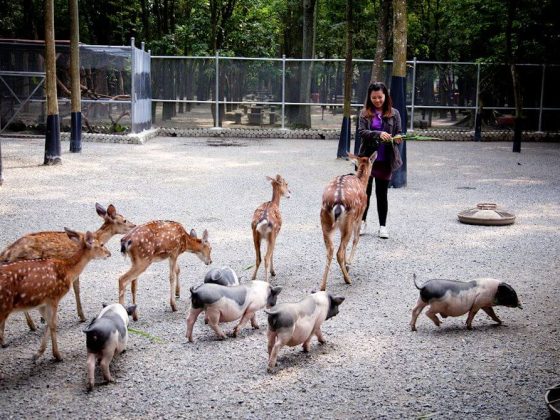Last week we talked about the logistics of experiencing Chinese New Year in Taiwan (Part one : Chinese New Year in Taiwan : The Six Days of Chinese New Year). This week, we’ll get down to the business of giving gifts, visiting etiquette and stuff like that. It might get confusing, so stick with us!
The Red Envelope

Perhaps no single item is as associated with Chinese New Year as the red envelope or hóng bǎo. Unlike the closest analogous holiday season to Chinese New Year in the west (December’s Christmas / Hanukkah / Kwanzaa period, or, if you’re not a fan of any of those, Seinfeld’s Festivus holiday) in which gifts between family members are usually store bought (or hand-made) items, in Taiwan the standard gift is money served in a perfumed red envelope.
Generally, the traditional hóng bǎo flow is from old to young; youth are the beneficiaries of the seasonal largess, and elders pay the bills. So, nothing all that different here.
Though a red envelope with a numerically auspicious amount of money (no odd numbers, avoid the number four, eight is lucky) is an absolutely appropriate gift for you to give on other occasions, as a house guest over Chinese New Year your hosts will not expect you to present them with money.
Their kids – if they have any – may feel differently.
Much in the way that western children see any house on Halloween as a source of free candy, Taiwanese kids see adults on Chinese New Year a potential source of red envelopes. If you already know your hosts have kids (and your relationship is close, or you wish to be seen as a truly stand-up sort), preparing a couple of red envelopes with a small amount of cash (NT$600 is generally the right amount for kids) will turn you from visitor to cherished friend for life, at least in the eyes of the kids in question. (Read more: A Guide to Lunar New Year Dining in Taiwan)
If there are going to be numerous children, your best bet is to come armed with lots of individually wrapped sweets that you can give out as the situation demands.
Which brings us to…
What to bring – and not to bring – to a Taiwanese home during Chinese New Year

A general gift for the household will definitely be appreciated by your host family. The list of welcome gifts isn’t all that different than what it would be in the west. A bottle of good wine or liquor will be appreciated in households that indulge. Sweets, fruits and pastries are fairly traditional Chinese New Year gifts that will generally be consumed with great praise with you in earshot. If you’re coming to the party from overseas, some sort of specialty item bought wherever you’ve come is generally a safe bet.
Unless the specialty item in question are shoes, clocks or mirrors.
Which brings us to the far lengthier topic of what not to bring to a Taiwanese home during Chinese New Year.
There are certain items which, for a whole host of reasons, are generally not considered suitable gifts in Taiwan and are in especially bad taste during the festival season. We’ll stay away from more esoteric items like shoes (seriously, who casually gives shoes as a gift?) and stick to things that the well intentioned but uninformed gift-giver might accidentally bring.
* Four of anything: The number four sounds like death in Chinese, and is therefore an inauspicious gift. (So if you were thinking of one of those trendy four packs of craft beer, bring two packs and tape ‘em together.)
* Clocks: A clock symbolizes the inexorable march of time, the end of which is always death. Hence, a clock is a bad gift. (A pity that no one told Texas Governor Greg Abbott this. He presented Taiwan President Tsai Ing-wen with one on a recent state visit.
* Mirrors: These are bad for a couple of reasons. First, they’re said to attract malicious spirits. And second, they tend to break into sharp pointy bits, which most cultures consider a bad thing.
* Blades: These symbolize the cutting of a relationship, and are thus considered a bad gift.
* Umbrellas: The Chinese word for ‘umbrella’ is a bit too close to the word for ‘break up’ (sǎn and sàn, respectively), and thus has negative relationship implications.
Anyway, why would you give someone in Taiwan an umbrella, when there’s always a free one waiting in the courtesy umbrella box at any Taipei metro station?
Chinese New Year Traditions and Etiquette

Chinese New Year is the most festive period in the year, so in general conversation ought to be kept festive.
Red is considered a good color to wear, and black and white are both considered gauche. (Except if you’re visiting the homes of Taiwanese goth kids or family ska bands, but honestly, such families in Taiwan would be considered non-traditional to say the least.)
One custom about which you should definitely be aware concerns fish: A whole fish will almost always be served as part of the dinner feast, as the fish symbolizes abundance and luck. However, tradition dictates that the fish remain unturned for the duration of the meal, as turning the fish is said to portent good luck turning bad (and in some coastal regions, shipwreck). While you’re perfectly free to pick away at the meat beneath the skeleton without turning it (thus demonstrating your superior chopstick skills, never a bad thing) it’s traditional to leave some fish uneaten so as to express your wish that the family’s abundance remains throughout the year.

Finally, expect to hear a few phrases throughout your visit.
The most common, of course, is xīn nián kuài lè, which means happy new year!
If you want to get fancy, you can preface this with zhù nín, as in zhù nín xīn nián kuài lè (“I wish you a happy new year”).
There are also some year-specific greetings, and since we’re coming into the year of the dog you can expect to hear “gǒu nián xin da yun!” (“Big fortune in the coming dog year!”)
…Often followed by wàngwàngwàng
Which sounds like both “Prosper! Prosper! Prosper!”
…and the sound of a dog barking.
Of course, another common phrase you’ll hear a lot of over the season are variations of the word Gongxi, which is a happy sort of congratulations, conveying with two simple syllables wishes for happiness, prosperity and joy. During the days of Chinese New Year, you’ll hear the phrase from dawn until well after dusk through endless repetition of a song that’s basically the Chinese equivalent of every Christmas song wrapped up in one.
Gōngxǐ! Gōngxǐ! Gōngxǐ!
[youtube https://www.youtube.com/watch?v=EeWnkw20F8c]Here’s a video from last year’s celebration (hence the chicken theme) with words in both Chinese and English. Listen to it to a) inoculate yourself, since if you’re in Taiwan during the holidays, again, you’ll be hearing it from dawn until well after dusk, and and b) now you know what the Chinese words that have been drilled into your skull actually mean. (They’re actually quite sweet.)
You’ll also be hearing gōngxǐ fācái.
(Read also: Gong Xi Fa Cai ! How to Spend Chinese New Year in Taiwan?)
But be careful using the phrase yourself around children. Saying gōngxǐ fācái to a child over the holidays generally invites the response
…hóngbāo ná lái!
Meaning “red Envelope, please!”

Along with an outstretched hand, the universal gesture for gimme!
Which does make sense, since gōngxǐ fācái means “congratulations, prosperity and wealth”, and by saying that to a kid you’re basically encouraging them, as Napoleon Hill might say, to think and grow rich. And what better way to start than by hitting up their new western friend for a gift that, according to custom, they’re kind of entitled to on this, the holiest of high holidays in the Chinese-speaking world?
Hope you have another red envelope handy!
Or at least some candy.
From Taiwan Scene & MyTaiwanTour, Happy New Year and Gōngxǐ fācái!












Comments are closed.